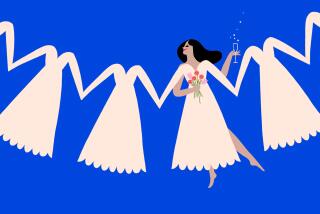COME TOGETHER : Ethnic, Modern American Customs Are Wed in Fullerton Exhibit With Local Dimensions
- Share via
When In Sook Lee Ku of Fullerton got married in Buena Park last year, she made sure to wear something old and something new. For her, that meant an entire wardrobe and makeup change, however.
Ku, born in Korea, wanted to have a contemporary, western-style wedding. But she also wanted to observe the older customs of her homeland.
So, first, she donned a long, glorious white gown, a gossamer veil and a lengthy train, and walked down the aisle toward the tuxedoed groom, Le Whan Ku. A while later, she painted each cheek with a round, red circle and dressed in the brilliantly rainbow-colored, kimonolike costume of her forebears to gather with friends for a second, traditional Korean ceremony.
The ways that various ethnic groups in the United States carry on often ancient customs in celebrating weddings, and how these groups alter the rituals in response to modern American customs, is the subject of an exhibit at the Fullerton Museum Center, which includes photographs of Ku, clad in her two disparate gowns.
“Something Old, Something New: Ethnic Weddings in America” presents a “very positive statement” about how ethnic groups preserve and perpetuate their cultural roots through the “I do” rite, with its myriad symbolic procedures, said Lynn La Bate, the museum center’s exhibition administrator.
As originally organized (by the Balch Institute for Ethnic Studies in Philadelphia and Modern Bride magazine), the exhibit was composed of about 75 photographs taken by Katrina Thomas.
Traveling across the country, Thomas captured such scenes as a Laotian couple having their wrists lightly tied together with string, a Jewish couple sipping wine beneath a chuppah (or wedding canopy), and a Cambodian bride who has changed for a reception into a western bridal gown after being wed in native dress.
La Bate, however, reached out to ethnic communities in Orange County to bring the exhibit alive with local color and transform it into a three-dimensional show. Now, in addition to the photographs, it consists of clothing and artifacts lent by local residents, as well as their own snapshots of weddings that lend homespun authenticity and an immediacy to the inanimate objects.
In the exhibit, cultural differences are illustrated with colorful traditional wedding dresses from local East Indian, Vietnamese, Japanese and Korean residents and such varied items as a Ukrainian embroidered towel used as a table decoration or a silver kiddush, a cup used by a Jewish bride and groom to share wine.
Similarities are brought to light as well. From a Mexican wedding, for instance, comes a small golden box filled with coins. “The groom gives the bride the coins and it’s a symbol that he’ll provide for her,” La Bate said. And from an Italian ceremony, there’s a pair of white satin high heels into which has been placed a penny, “given to the bride by her father to ensure her prosperity.”
Westernization is also evident beyond Ku’s photographs. She has lent a delicate, hand-painted pink dress made by her mother that, according to Korean tradition, should have been worn at an engagement party--the color pink symbolizes an engagement. Ku wore it instead as her “going away” dress, feeling that now “you can make your own decisions and own ways,” she said.
What: “Something Old, Something New: Ethnic Weddings in America.” Also, “I Do! I Do! Wedding Fashions from 1820 to 1920.”
When: Through Aug. 18. Museum hours are 11 a.m.-4 p.m., Tuesday, Wednesday, Saturday and Sunday; 11 a.m.-9 p.m., Thursday and Friday.
Where: Fullerton Museum Center, 301 N. Pomona Ave., Fullerton.
Whereabouts: Orange (57) Freeway to the Chapman Avenue exit. Drive west to Pomona Avenue (one block past Lemon Street) and turn left.
Wherewithal: Admission is $2 for adults, $1 for students and seniors. Museum members and children under 12 get in free.
Where to call: (714) 738-6545.
More to Read
Sign up for Essential California
The most important California stories and recommendations in your inbox every morning.
You may occasionally receive promotional content from the Los Angeles Times.










